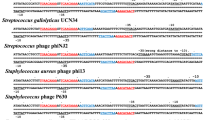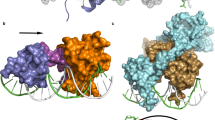Abstract
The function of the invertible G region of bacteriophage Mu is apparently to confer different host specificities on Mu. Two products of genes S and U, situated in the G region are not needed for the infectivity of Mu G(−) particles. In the Mu G(−) phage the S gene product and the 21-K polypeptide, presumably the product of gene U, are missing. Instead, two other polypeptides with different molecular weights are observed.
This is a preview of subscription content, access via your institution
Access options
Subscribe to this journal
Receive 51 print issues and online access
$199.00 per year
only $3.90 per issue
Buy this article
- Purchase on Springer Link
- Instant access to full article PDF
Prices may be subject to local taxes which are calculated during checkout
Similar content being viewed by others
References
Daniell, E., Abelson, J., Kim, J. S. & Davidson, N. Virology 51, 237 (1973).
Hsu, M. T. & Davidson, N. Proc. natn. Acad. Sci. U.S.A. 69, 2823 (1972).
Kamp, D., Kahmann, R., Zipser, D., Broker, T. R. & Chow, L. T. Nature 271, 577 (1978).
Symonds, N. & Coello, A. Nature 271, 573 (1978).
Howe, M. M. Nature 271, 608 (1978).
De Graaf, J., Kreuningen, P. C. & Van de Putte, P. Molec. gen. Genet. 123, 283 (1973).
Richardson, J. P., Grimley, C. & Lowery, C. Proc. natn. Acad. Sci. U.S.A. 72, 1725 (1975).
Allet, B. et al. in DNA Insertion Elements, Plasmids and Episomes (eds Bukhari, A. I. et al.) 745 (Cold Spring Harbor Laboratories, New York, 1977).
Howe, M. M., Schumm, J. W. & Taylor, A. L. Virology 92, 108 (1979).
Giphart-Gassler, M., Wijffelman, C. A. & Reeve, J. N. J. molec. Biol. (submitted).
Magazin, M., Reeve, J. N., Maynard-Smith, S. & Symonds, N. FEMS Microbiol. Lett. 4, 5 (1978).
Toussaint, A. Virology 70, 17 (1976).
Chow, L. T. and Bukhari, A. I. Virology 74, 242 (1976).
Toussaint, A. et al. Virology 89, 146 (1978).
Tonegawa, S., Hozumi, N., Matthussens, G. & Sculler, R. Cold Spring Harb. Symp. quant. Biol. 41, 877 (1976).
Honjo, T. & Kataoka, T. Proc. natn. Acad. Sci. U.S.A. 75, 2140 (1978).
Zeig, J., Hilmen, M. & Simon, M. Cell 15, 237 (1978).
Hicks, J. B., Strathern, J. N. & Herskowitz, I. in DNA Insertion Elements, Plasmids and Episomes (eds Bukhari, A. I. et al.) 457 (Cold Spring Harbor Laboratories, New York, 1977).
Laemmli, U. K. Nature 227, 680 (1970).
Author information
Authors and Affiliations
Rights and permissions
About this article
Cite this article
van de Putte, P., Cramer, S. & Giphart-Gassler, M. Invertible DNA determines host specificity of bacteriophage Mu. Nature 286, 218–222 (1980). https://doi.org/10.1038/286218a0
Received:
Accepted:
Issue Date:
DOI: https://doi.org/10.1038/286218a0
This article is cited by
-
Phage tail fibre assembly proteins employ a modular structure to drive the correct folding of diverse fibres
Nature Microbiology (2019)
-
Site-specific recombinases as tools for heterologous gene integration
Applied Microbiology and Biotechnology (2011)
-
Genomic sequence and activity of KS10, a transposable phage of the Burkholderia cepacia complex
BMC Genomics (2008)
-
Nucleotide sequence of diatom plasmids: identification of open reading frames with similarity to site-specific recombinases
Plant Molecular Biology (1992)
-
Spatial relationship of the Fis binding sites for Hin recombinational enhancer activity
Nature (1987)
Comments
By submitting a comment you agree to abide by our Terms and Community Guidelines. If you find something abusive or that does not comply with our terms or guidelines please flag it as inappropriate.



